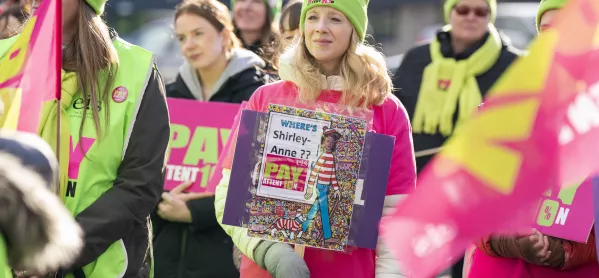Scottish teachers ‘absolutely resolute’ as national strike starts

Members of the EIS and NASUWT teaching unions have started two days of national strike action as part of the long-running pay dispute, and have said there is a growing number of teachers on picket lines.
Meanwhile, education secretary Shirley-Anne Somerville, who has again criticised the EIS for not putting the latest pay offer to a members’ vote, said she was “offering meetings” with unions every day this week in the hope of finding a resolution.
Today’s strike action comes after EIS members took three days of targeted strike action last week in areas represented by five key politicians, including Ms Somerville and first minister Nicola Sturgeon.
- Also today: Latest updates on teacher strikes in England
- Survey: More Scots support teacher strikes than don’t
- Related: Government has until Friday to make improved pay offer, says SSTA
The headline figures in the latest offer announced by Ms Somerville earlier this month were 6 per cent for 2022-23 - still far short of the 10 per cent the EIS has been campaigning for - and 5.5 per cent for 2023-24.
On Friday, the Scottish Secondary Teachers’ Association (SSTA) withdrew from the strike action planned for today and tomorrow, in the expectation of an improved pay offer in the coming days, after a member survey found they would very marginally vote in favour of accepting the latest Scottish government pay offer.
Primary school leaders’ body the AHDS also withdrew from this week’s strikes after a majority voted in favour of accepting the latest pay offer.
However, EIS general secretary Andrea Bradley said: “EIS members remain absolutely resolute in their determination to secure a fair pay settlement from the Scottish government and [local authorities’ body] Cosla.
“This two-day national strike action is a further clear signal that Scotland’s teachers are not prepared to accept the deep real-terms pay cut that is being offered to them.
“Support for the ongoing programme of strike action remains very strong, with a growing number of teachers out on picket lines with each day of action.”
NASUWT general secretary Patrick Roach said: “The decision of our members to reject the revised pay offer and continue with industrial action reflects the level of anger and frustration towards ministers and employers at their refusal to offer teachers a real-terms pay rise.
“Teachers feel taken for granted by the Scottish government and Cosla who seem to expect them to be satisfied with yet another year of pay erosion as their workloads become steadily more demanding.
Dr Roach added: “Three-quarters of members who responded to our consultative survey on the latest pay award expressed support for further industrial action to secure an improved pay offer. Members are determined and ready to continue to fight for a pay award that is worthy of their hard work and skills.”
The Scottish government has said the 10 per cent increase sought by the EIS is unaffordable.
Education secretary Shirley-Anne Somerville said: “The continuing disruption to children and young people’s education as a result of teacher strikes is completely unacceptable. Pupils in some areas are being hit particularly badly by targeted action, simply because of where they live.”
She added: “I am pleased that SSTA and AHDS members accepted the offer and have postponed strike action this week. The EIS rejected it outright, without even giving its members a chance to consider it. That is really disappointing and I am sure some members would have welcomed the chance to properly consider this latest offer.
“But the longer we make no progress, the more education is disrupted, particularly in the run-up to the exam diet.”
Ms Somerville said: “I have asked the teaching unions to resume pay talks urgently. I am offering meetings with the deputy first minister [John Swinney] or myself each and every day this week, if necessary, to make progress on this.”
She called on unions to suspend industrial action while talks take place and said there was “an opportunity this week to intensify discussions and negotiations to reach a settlement - and I hope the unions will recognise that and respond accordingly”.
The figures the education secretary has repeatedly cited have been an 11.5 pay offer over two years and a “cumulative increase of almost 30 per cent since January 2018”, but the EIS (see below) says such statistics are misleading and mask the real-terms pay decline teachers have seen since 2008.
The education secretary was asked about the potential impact on exams when she appeared on BBC radio’s Good Morning Scotland programme today.
Last week, the EIS said it was up to individual teachers if they wanted to be SQA markers, even though “targeting of SQA-related activity” was “outwith the scope of the current industrial action”.
She said: “We are working to ensure that children and young people will be able to sit their exams, that the exam diet continues.
“It is deeply disappointing - I’ll be frank - to suggest, as the EIS has done, to encourage their members not to sign up to mark children and young people’s papers.”
You need a Tes subscription to read this article
Subscribe now to read this article and get other subscriber-only content:
- Unlimited access to all Tes magazine content
- Exclusive subscriber-only stories
- Award-winning email newsletters
Already a subscriber? Log in
You need a subscription to read this article
Subscribe now to read this article and get other subscriber-only content, including:
- Unlimited access to all Tes magazine content
- Exclusive subscriber-only stories
- Award-winning email newsletters
topics in this article



